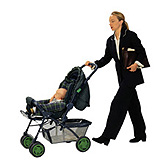
FRIDAY, May 15, 2015 (HealthDay News) — Women who are single mothers before age 50 may be at increased risk for poor health later in life, according to a new study.
Any period of single motherhood before age 50 was associated with a greater risk of poor health and physical disability years later. The link was strongest among single mothers in the United States, England, Denmark and Sweden.
Overall, the highest risk of poor health and disability was among women who became single mothers before age 20, became single mothers due to divorce, parented alone for eight or more years, or had two or more children, the study found.
“The findings add to the growing recognition that single motherhood may have long-term health effects on mothers. As lone motherhood is on the rise in many countries, policies addressing health disadvantages of lone mothers may be essential to improving women’s health and reducing disparities,” wrote the researchers, led by Dr. Lisa Berkman, director of the Harvard Center for Population and Development Studies in Cambridge, Mass.
Although the study found a link between being single mothers and poorer health, it’s important to note that it wasn’t designed to prove a cause-and-effect relationship.
The study was published online recently in the Journal of Epidemiology & Community Health.
Researchers looked at data from more than 25,000 women 50 and older in the United States, England and 13 European countries. The women were surveyed about their marital status, children, overall health and their ability to do daily tasks.
One-third of U.S. mothers were single mothers before age 50. In England and Western European countries, 22 percent of women were single moms before 50. And just under 40 percent of women in Denmark and Sweden, and 10 percent of those in southern Europe were single mothers before age 50.
Single motherhood was defined as having a child younger than 18 and not being married.
Single mothers in all countries tended to be younger and poorer. In the United States and England, single mothers also tended to have less education.
The researchers said their findings suggest the need for wider access to birth control and policies that help single mothers remain in the workforce and help them balance work-family demands.
More information
The American Academy of Pediatrics has more about single parent families.
Copyright © 2026 HealthDay. All rights reserved.

